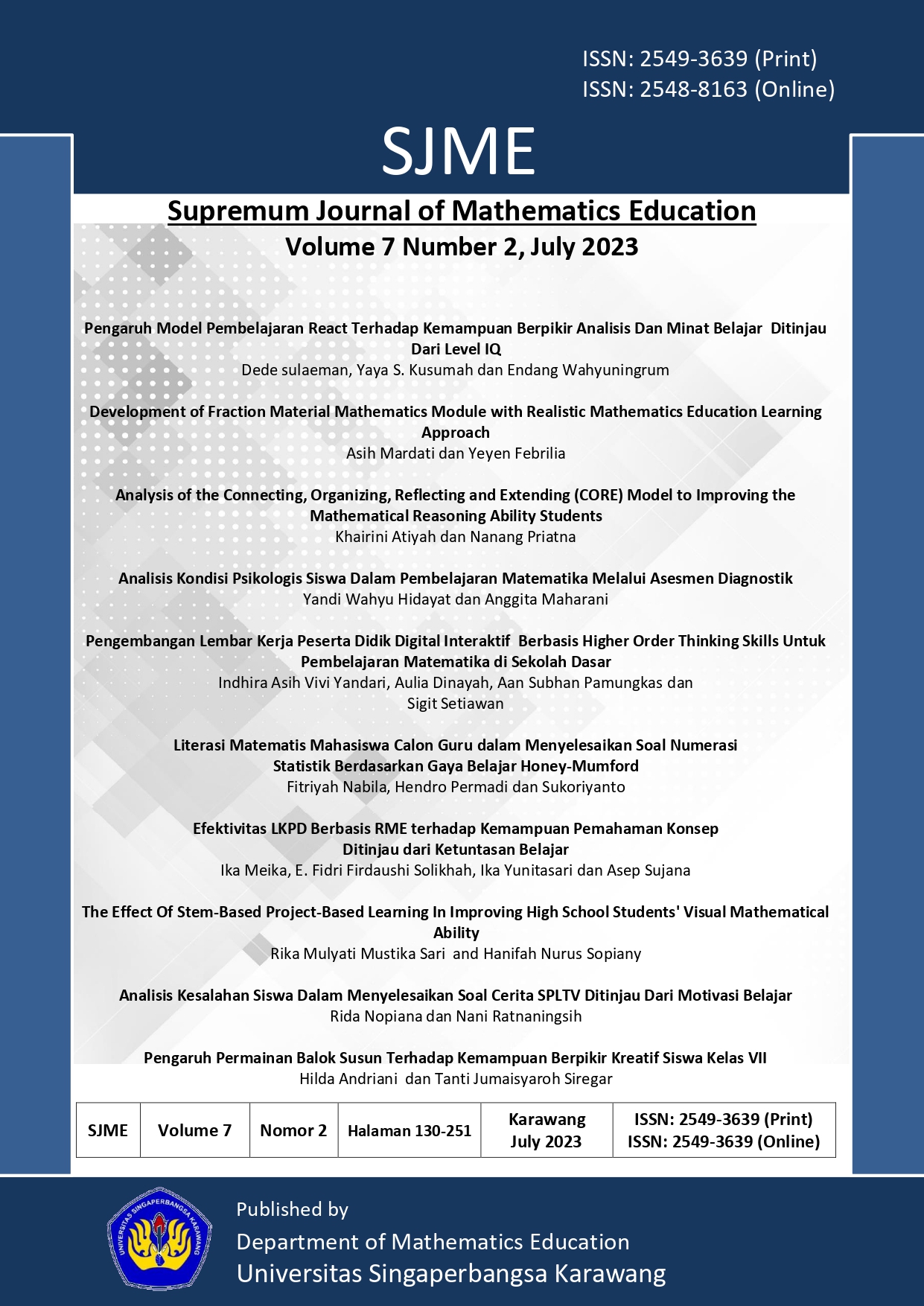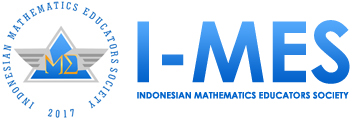Efektivitas LKPD Berbasis RME terhadap Kemampuan Pemahaman Konsep Ditinjau dari Ketuntasan Belajar
DOI:
https://doi.org/10.35706/sjme.v7i2.9314Abstract
This research is a continuation of the article Development of Trigonometric Material Teaching Materials through the RME Approach (Meika et al., 2023). Before the teaching materials that have been developed are used, it is necessary to know in advance the effectiveness of the teaching materials. Therefore, it is necessary to trial the use of these teaching materials in a class to determine their effectiveness. The purpose of this study is to determine the effectiveness of RME-based LKPD on the ability to understand concepts in terms of learning completeness. The method used is Design Based Research (DBR) with the Plomp development model consisting of three stages, namely: Preliminary Research, Prototyping Stage and Assessment. This article contains the results of the assessment phase. At the assessment stage, a final test was carried out and filled out a student response questionnaire to determine the effectiveness of the LKPD that had been developed. The effectiveness of LKPD is seen from the completeness of student learning outcomes. The final test results showed that the average score of class X Science 1 was 78 with three students who did not complete KKM. KKM Madrasah Aliyah Mathla'ul Anwar Menes Centre is 71. The percentage of students who achieved completion was 85.72%. Therefore, LKPD products have been effective in developing students' ability to understand mathematical concepts. The results of the student response questionnaire showed that the average percentage of all aspects assessed was 77.87% with the category "Good".
Downloads
References
Dinar, I. (2019). Penerapan Bahan Ajar Matematika Berbasis RME Terhadap Kemampuan Pemahaman Konsep Matematis dan Self-Confidence Siswa pada Materi Trigonometri. JURNALPEKA, 2(2), 49–55.
Kennedy-Clark, S. (2013). Research by Design: Design-Based Research and the Higher Degree Research Student. Journal of Learning Design, 6(2), 26–32.
Limbong, Y. A. C. (2021). Pengembangan Video Pembelajaran dan LKPD Berbasis Geogebra pada Materi Trigonometri Kelas X SMA. Universitas Sanata Dharma.
Meika, I., Solikhah, E. F. F., & Yunitasari, I. (2023). Pengembangan Bahan Ajar Materi Trigonometri melalui Pendekatan Realistic Mathematics Education. SJME (Supremum Journal of Mathematics Education), 7(1). https://doi.org/10.35706/sjme.v7i1.7190
Meika, I., Suryadi, D., & Darhim, D. (2019). Analysis of students’ mathematical modelling ability in solving combination problems using local instruction theory teaching materials. Journal of Physics: Conference Series, 1157(4). https://doi.org/10.1088/1742-6596/1157/4/042082
Puspitasari, T., Syamsuri, & Santosa, C. A. H. F. (2021). Konstruksi Konsep Trigonometri Bagi Siswa Sma Berdasarkan Teori Apos. WILANGAN: Jurnal Inovasi Dan Riset Pendidikan Matematika, 2(4), 178–195.
Rahman, M. H., Luthfiana, M., & Yanto, Y. (2017). Pengembangan Lembar Kerja Siswa Dengan Pendekatan Pendidikan Matematika Realistik Indonesia Pada Materi Trigonometri Kelas X Sma Negeri 1 Lubuklinggau. In Jurusan Matematika dan Ilmu Pengetahuan Alam STKIP-PGRI.
Riyadi, S., & Qamar, K. (2020). Efektivitas E-Modul Analisis Real Pada Program Studi Pendidikan Matematika Universitas Kanjuruhan Malang. SJME (Supremum Journal of Mathematics Education), 1(1). https://doi.org/10.35706/sjme.v1i1.554
Sari, A., & Yuniati, S. (2018). Penerapan Pendekatan Realistic Mathematics Education (Rme) Terhadap Kemampuan Pemahaman Konsep Matematis. Jurnal Cendekia: Jurnal Pendidikan Matematika, 2(2), 71–80.
Schemme, D., & Novak, H. (2017). Gestaltungsorientierte Forschung - Basis für soziale Innovationen erprobte Ansätze im Zusammenwirken von Wissenschaft und Praxis.
Setiani, A., Kartiwi, A. P., & Wulandari, H. (2018). Pengembangan Bahan Ajar Kompilasi Berupa Modul Pada Mata Kuliah Aljabar Matriks Di Universitas Muhammadiyah Sukabumi. SJME (Supremum Journal of Mathematics Education), 2(1). https://doi.org/10.35706/sjme.v2i1.924
Sujana, A., Rosdianwinata, E., Henriyan, H., & Gadri, A. (2018). Makna Low Of Attraction : Mengungkap Rahasia Minat. Seminar Nasional, 01, 406–417.
Tamur, M., Juandi, D., & Adem, A. M. G. (2020). Realistic Mathematics Education in Indonesia and Recommendations for Future Implementation: A Meta-Analysis Study. JTAM | Jurnal Teori Dan Aplikasi Matematika, 4(1), 17. https://doi.org/10.31764/jtam.v4i1.1786
Downloads
Published
How to Cite
Issue
Section
License

This work is licensed under a Creative Commons Attribution-ShareAlike 4.0 International License.
Authors who publish with this journal agree to the following terms:
- Authors retain copyright and grant the journal right of first publication with the work simultaneously licensed under a Creative Commons Attribution License that allows others to share the work with an acknowledgment of the work's authorship and initial publication in this journal.
- Authors are able to enter into separate, additional contractual arrangements for the non-exclusive distribution of the journal's published version of the work (e.g., post it to an institutional repository or publish it in a book), with an acknowledgment of its initial publication in this journal.
- Authors are permitted and encouraged to post their work online (e.g., in institutional repositories or on their website) prior to and during the submission process, as it can lead to productive exchanges, as well as earlier and greater citation of published work (See The Effect of Open Access).












